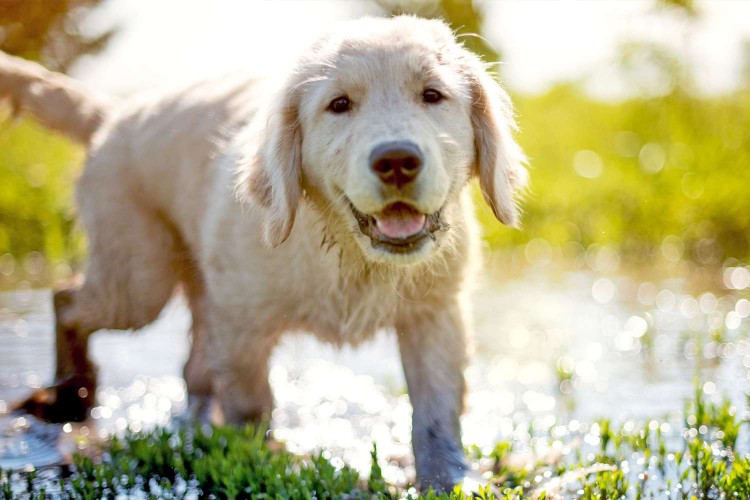
As sweet as our canine pals usually are, they can also have heaps of attitude. Consider a sassy Siberian husky refusing to leave a dog park or an Italian greyhound chewing up his dog bed while his hoomans were away. We laugh, sure, but this behavior can't go on forever.
Just as some teenagers push against boundaries, young pups do, too. According to 2020 study results published in the scientific journal Biology Letters, which is part of The Royal Society Publishing, "adolescence [is] a vulnerable time for dog–owner relationships."
How Adolescent Dogs Act Similarly to Teenage Humans
Lead study author Naomi Harvey, PhD, a zoologist who specializes in companion animal behavior and welfare, says she and her fellow researchers believed the dog-owner connection would parallel the parent-child relationship in several ways. So, they studied potential guide dogs in the United Kingdom. The breeds studied were German shepherds, golden retrievers, Labrador retrievers, and crosses of these, all of which go through puberty when they're about 6–9 months old.
The team of researchers first analyzed 70 dogs and their attachment behavior, which is how the dogs acted when their owner left them alone. They found that 5-month-old pups who shared more attachment and attention-seeking behavior—such as being close to their owner when they're around and showing distress when they're not—were more likely to enter puberty earlier.
In the second phase of the study, the research team studied how 93 dogs responded to cues given by their caregiver compared to a stranger. Some dogs were studied when they were pre-adolescents at 5 months old, and others tested during adolescence at 8 months old.
What Is a Cue and How Is It Different From a Command in Pet Training?
The team discovered the older group of dogs was less likely to "respond to a "sit" cue than the younger pups. And this happened only when they were told to do so by their caregiver, not a stranger. In fact, the adolescents were almost twice as likely to ignore the sit cues—and probably with the typical teenage heavy sighs and eye rolls, too. Researchers concluded that adolescent dogs can mimic similar behaviors as human teenagers.
Though, keep in mind this is just the findings of one study and may not be representative of all adolescent dog behavior.
Ways to Cope With Adolescent Dogs
Harvey doesn't want these findings to upset pet parents in any way. Instead, she wants them to know how to prepare for a furry buddy's awkward transition from puppydom to adulthood.
"For dog owners, the critical message from this study is that, yes, your dog is likely to exhibit some problem behaviors during adolescence, including reduced obedience and perhaps increased separation anxiety, but it's a completely normal part of the development, and it will pass," she explains.
She stresses that no matter how frustrated you might get, punishing your pup is never the answer. "Especially at this age [when] it could backfire and make things worse, as it's a sensitive time in the dogs' behavioral development," Harvey says.
Mikkel Becker, KPA CTP, CBCC-KA, CPDT-KA, CDBC, is a dog behavior consultant and lead animal trainer for Fear Free. She says this is definitely a tough time for dogs and their pet parents.
"The dogs are very interested in investigating their world and exploring," Becker says. "However, don't be discouraged: Training can still be accomplished at this time. No matter how frustrated we may get, our perseverance and patience will pay off."
How to Find a Dog Trainer or Behavior Expert With the Right Experience for Your Pet
Becker shares some essential tips that help both you and your pooch navigate through the terrible teens.
- Encourage "say please" behavior. "They must respond to you and what you're asking them to do. Build meaning behind why they should listen to you, whether that's to go outside, go for a walk, get their food, and so on," Becker says. Just ask them for something simple, such as "four on the floor" if your dog is jumping up. You can also ask them for a "sit" or a "down". "Even if they don't know these commands yet, wait them out: As soon as they calm down and sit, reward them with what they want, like the walk or the treat," she adds.
- Offer numerous enrichment activities. Dogs at this age especially will want to dig, chew, scavenge, and explore. "Make an indoor or outdoor dig pit or give them a food puzzle for meal times," Becker says. "When you're on a walk, encourage them to sniff and play. Don't be a drill sergeant taking away their fun!"
- Contain door dashers. Becker notes that adolescent dogs really have a desire to get out, go new places, and be free. "Be sure you're telling them to 'sit' before opening the door, take extra long walks, and frequently visit the dog park. Ideally, three walks a day for dogs this age would be ideal."
Harvey adds that adolescence in dogs is still understudied, but she'd like to see that change. "[It] would inform us on how best to raise an adolescent dog into a happy, healthy, and emotionally stable adult, which will improve life for both dogs and their owners."
Updated by Jennifer Aldrich was the social media editor for Better Homes & Gardens and ran the Facebook, Instagram, TikTok, and Twitter accounts. Jennifer also shot and edited video. She was with the brand for nearly three years.
" tabindex="0" > Jennifer Aldrich Jennifer Aldrich
Jennifer Aldrich was the social media editor for Better Homes & Gardens and ran the Facebook, Instagram, TikTok, and Twitter accounts. Jennifer also shot and edited video. She was with the brand for nearly three years.
Learn More








